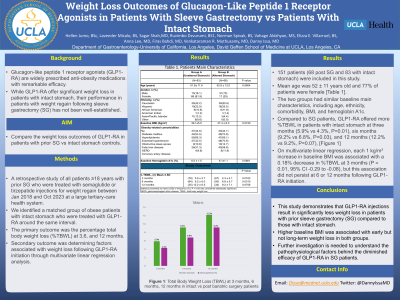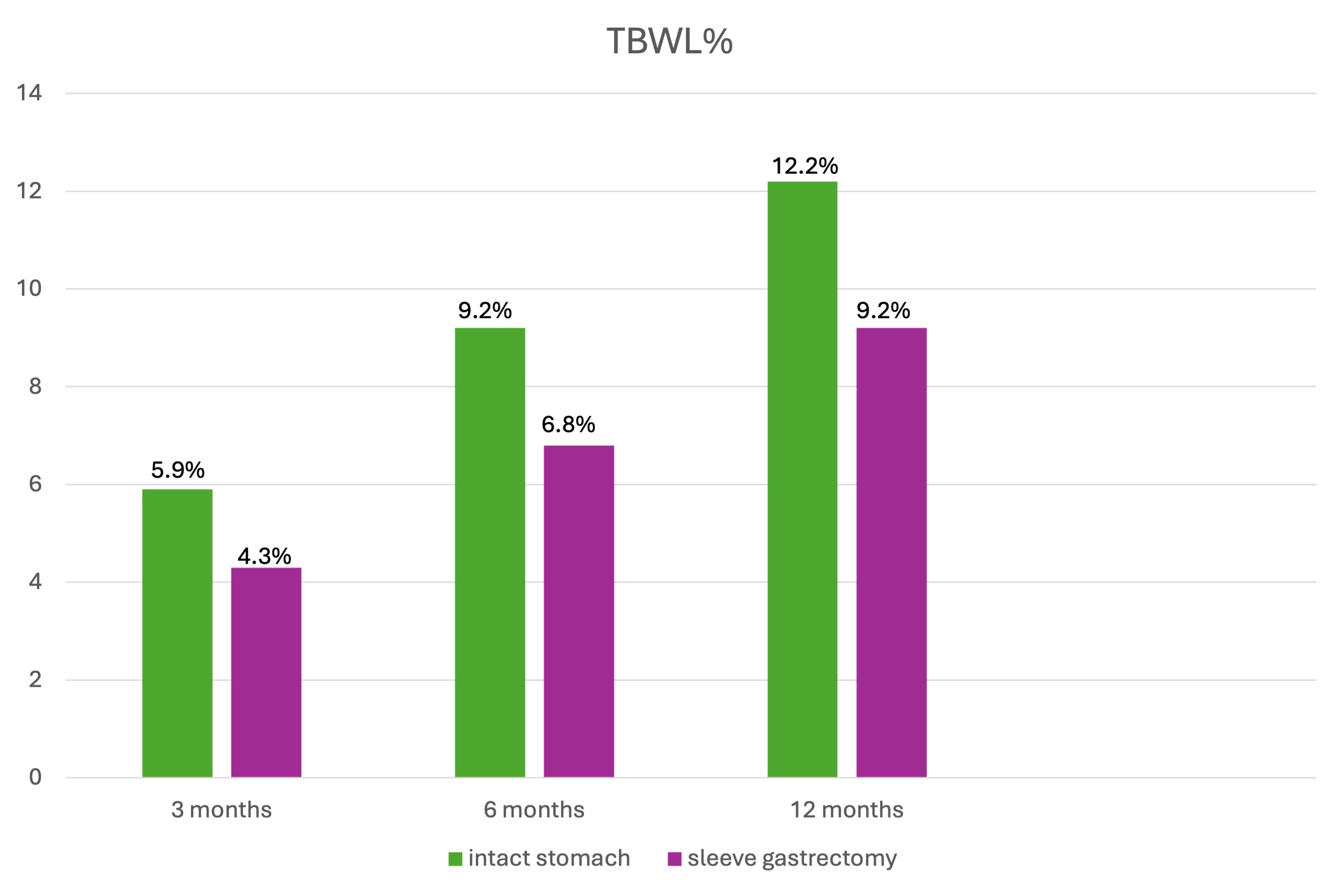Monday Poster Session
Category: Stomach
P3331 - Weight Loss Outcomes of Glucagon-Like Peptide 1 Receptor Agonists in Patients With Sleeve Gastrectomy vs Patients With Intact Stomach
Monday, October 28, 2024
10:30 AM - 4:00 PM ET
Location: Exhibit Hall E

Has Audio

Hellen Jumo, BSc
David Geffen School of Medicine at UCLA
Los Angeles, CA
Presenting Author(s)
Hellen Jumo, BSc1, Lavender Micalo, BS1, Sagar Shah, MD1, Ruvimbo Dzvurumi, BS1, Norman Spivak, BS1, Vahagn Aldzhyan, MS1, Elizza E. Villarruel, BS2, Anna Lee, MD1, Firas Bahdi, MD1, Venkataraman R. Muthusamy, MD3, Danny Issa, MD1
1David Geffen School of Medicine at UCLA, Los Angeles, CA; 2David Geffen School of Medicine at UCLA, La Puente, CA; 3David Geffen School of Medicine at UCLA, Sherman Oaks, CA
Introduction: Glucagon-like peptide 1 receptor agonists (GLP1-RA) are widely prescribed anti-obesity medications with remarkable efficacy. While GLP1-RA offer significant weight loss in patients with intact stomach, their performance in patients with weight regain following sleeve gastrectomy (SG) has not been well-established. We here compare the weight loss outcomes of GLP1-RA in patients with prior SG vs intact stomach controls.
Methods: A retrospective study of all patients ≥18 years with prior SG who were treated with semaglutide or tirzepatide injections for weight regain between Jan 2018 and Oct 2023 at a large tertiary-care health system. We identified a matched group of obese patients with intact stomach who were treated with GLP1-RA around the same interval. The primary outcome was the percentage total body weight loss (%TBWL) at 3,6, and 12 months. Secondary outcome was determining factors associated with weight loss following GLP1-RA initiation through multivariate linear regression analysis.
Results: The study included 151 patients (68 post SG and 83 with intact stomach). Mean age was 52 ± 11 years old and 77% of patients were female [Table 1]. The two groups had similar baseline characteristics, including age, ethnicity, comorbidity, BMI, and hemoglobin A1c. Compared to SG patients, GLP1-RA offered more %TBWL in patients with intact stomach at three months (5.9% vs 4.3%, P=0.01), six months (9.2% vs 6.8%, P=0.03), and 12 months (12.2% vs 9.2%, P=0.07), [Figure 1]. On multivariate linear regression analysis, baseline BMI was significantly associated with %TBWL at three months as each 1 kg/m2 increase in BMI was associated with a 0.18 decrease in %TBWL at three months (P= 0.01 and 95% CI -0.29 to -0.08). This association did not persist at 6 or 12 months following GLP1-RA initiation.
Discussion: GLP1-RA injections offered significantly less weight loss in patients with prior sleeve gastrectomy than those with intact stomachs. Higher baseline BMI predicted early but not long-term weight loss. Future studies are encouraged to explore the pathophysiological causes behind the observed lower GLP1-RA efficacy in SG patients.

Note: The table for this abstract can be viewed in the ePoster Gallery section of the ACG 2024 ePoster Site or in The American Journal of Gastroenterology's abstract supplement issue, both of which will be available starting October 27, 2024.
Disclosures:
Hellen Jumo, BSc1, Lavender Micalo, BS1, Sagar Shah, MD1, Ruvimbo Dzvurumi, BS1, Norman Spivak, BS1, Vahagn Aldzhyan, MS1, Elizza E. Villarruel, BS2, Anna Lee, MD1, Firas Bahdi, MD1, Venkataraman R. Muthusamy, MD3, Danny Issa, MD1. P3331 - Weight Loss Outcomes of Glucagon-Like Peptide 1 Receptor Agonists in Patients With Sleeve Gastrectomy vs Patients With Intact Stomach, ACG 2024 Annual Scientific Meeting Abstracts. Philadelphia, PA: American College of Gastroenterology.
1David Geffen School of Medicine at UCLA, Los Angeles, CA; 2David Geffen School of Medicine at UCLA, La Puente, CA; 3David Geffen School of Medicine at UCLA, Sherman Oaks, CA
Introduction: Glucagon-like peptide 1 receptor agonists (GLP1-RA) are widely prescribed anti-obesity medications with remarkable efficacy. While GLP1-RA offer significant weight loss in patients with intact stomach, their performance in patients with weight regain following sleeve gastrectomy (SG) has not been well-established. We here compare the weight loss outcomes of GLP1-RA in patients with prior SG vs intact stomach controls.
Methods: A retrospective study of all patients ≥18 years with prior SG who were treated with semaglutide or tirzepatide injections for weight regain between Jan 2018 and Oct 2023 at a large tertiary-care health system. We identified a matched group of obese patients with intact stomach who were treated with GLP1-RA around the same interval. The primary outcome was the percentage total body weight loss (%TBWL) at 3,6, and 12 months. Secondary outcome was determining factors associated with weight loss following GLP1-RA initiation through multivariate linear regression analysis.
Results: The study included 151 patients (68 post SG and 83 with intact stomach). Mean age was 52 ± 11 years old and 77% of patients were female [Table 1]. The two groups had similar baseline characteristics, including age, ethnicity, comorbidity, BMI, and hemoglobin A1c. Compared to SG patients, GLP1-RA offered more %TBWL in patients with intact stomach at three months (5.9% vs 4.3%, P=0.01), six months (9.2% vs 6.8%, P=0.03), and 12 months (12.2% vs 9.2%, P=0.07), [Figure 1]. On multivariate linear regression analysis, baseline BMI was significantly associated with %TBWL at three months as each 1 kg/m2 increase in BMI was associated with a 0.18 decrease in %TBWL at three months (P= 0.01 and 95% CI -0.29 to -0.08). This association did not persist at 6 or 12 months following GLP1-RA initiation.
Discussion: GLP1-RA injections offered significantly less weight loss in patients with prior sleeve gastrectomy than those with intact stomachs. Higher baseline BMI predicted early but not long-term weight loss. Future studies are encouraged to explore the pathophysiological causes behind the observed lower GLP1-RA efficacy in SG patients.

Figure: Figure 1: Total Body Weight Loss (TBWL) at 3 months, 6 months, 12 months in intact vs post bariatric surgery patients
Note: The table for this abstract can be viewed in the ePoster Gallery section of the ACG 2024 ePoster Site or in The American Journal of Gastroenterology's abstract supplement issue, both of which will be available starting October 27, 2024.
Disclosures:
Hellen Jumo indicated no relevant financial relationships.
Lavender Micalo indicated no relevant financial relationships.
Sagar Shah indicated no relevant financial relationships.
Ruvimbo Dzvurumi indicated no relevant financial relationships.
Norman Spivak: BrainSonix Corp – Consultant.
Vahagn Aldzhyan indicated no relevant financial relationships.
Elizza Villarruel indicated no relevant financial relationships.
Anna Lee indicated no relevant financial relationships.
Firas Bahdi indicated no relevant financial relationships.
Venkataraman Muthusamy: Boston Scientific – Consultant, Grant/Research Support. Capsovision – Stock Options, Stock-privately held company. Castle Biosciences – Consultant, Speakers Bureau. Endogastric Solutions – Advisory Committee/Board Member, Consultant, Speakers Bureau. Medtronic – Consultant. Pentax Medical – Consultant.
Danny Issa: Boston Scientific – Consultant, Speakers Bureau. Eli Lilly – Speakers Bureau.
Hellen Jumo, BSc1, Lavender Micalo, BS1, Sagar Shah, MD1, Ruvimbo Dzvurumi, BS1, Norman Spivak, BS1, Vahagn Aldzhyan, MS1, Elizza E. Villarruel, BS2, Anna Lee, MD1, Firas Bahdi, MD1, Venkataraman R. Muthusamy, MD3, Danny Issa, MD1. P3331 - Weight Loss Outcomes of Glucagon-Like Peptide 1 Receptor Agonists in Patients With Sleeve Gastrectomy vs Patients With Intact Stomach, ACG 2024 Annual Scientific Meeting Abstracts. Philadelphia, PA: American College of Gastroenterology.
